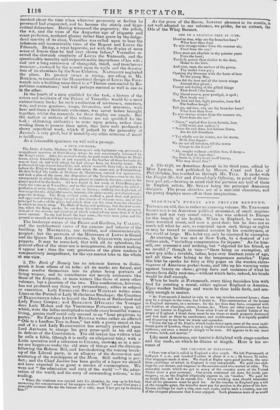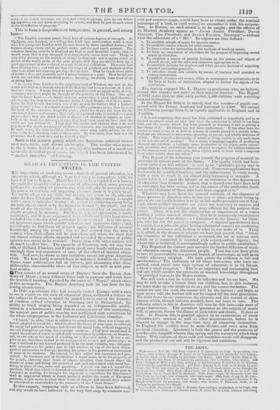SEDGW1CK'S PUBLIC AND PRIVATE ECONOMY.
THOUGH an odd, this is rather an amusing volume. Mr. THEODORE SEDGWICK is an American political economist, of small acquire- ments and not very sound views, who was ordered to Europe for the benefit of his health. When in England, he seems to have travelled about, and seen a good deal ; but he does not so much tell what he saw, as comment upon such things or sights as may be turned to economical account by his countrymen, or the world at large. His habit can only be conveyed by examples. At starting, he was met at New York, by a demand of 140 dollars each, "including compensation for liquors." As for him- self, our economist said nothing, but "objected for his friend, as an invalid ;" though in vain—" there being no exemption, all must pay alike ; invalids, ladies, boys over fourteen years of age, and all those who belong to the temperance societies." Upon this hint he speaks for forty or fifty pages on the wanton extra- vagance of American packet-boats, and lifts up his warning voice against luxury on shore; giving facts and instances of what he means from daily customs,—without which facts, indeed, his tirade would be dull enough.
When he lands at Portsmouth, every thing furnishes him with food for pointing a moral, either against England or America. Upon wooden buildings and waste he thus holds forth, and sen- sibly enough in matter.
"At Portsmouth I looked in vain to see one wooden-covered house; there may be a shingle in the town, but I doubt it. This construction of the houses in England accounts, in a measure, for the few fires they have, compared with our bonfires of churches, stores, houses, &e. There are other causes for fires here not known in England. From what I saw of the careful habits of the people of England, I think there must be ten times as much property destroyed and lost here as there by carelessness and recklessness. It is equally painful and disgusting to see how we waste and squander. " From the top of St. Paul's, which looks down upon some of the most indif- ferent parts of London, there is not a single wooden-roof, partition-fence, stable, outhouse, not even a board or shingle to be seen. All appears to be one mass of stone, brick, and mortar."
Like most Americans, our tourist is delighted with stage-coaches and the roads, on which he dilates at length. Here is his ac- count of
THE. CHEAPEST OF PLEASURES.
"Ours was what is called in England a slow coach. We left Portsmouth at half-past 8 A.3I. and reached London at about 6 r.sr. ; tl hours, 72 miles. Our stoppages made it slow. We dined at Ripley upon good mutton, the uni- form excellence of which in England is very remarkable. We paid two shil- lings for our dinner, and sixpence to the servant.maid who waited at table. The miserable meats which we get in many of the country parts of the United States show a poor economy. Our coach contained six seats for inside pas- sengers or, as the English elliptically express it, six insides.' We paid for an inside 16s. and for an outside I ls. Every working man should remember that all his pleasures must be paid for. As the coaches in England pay a toll at the turnpike gates, the traveller must pay his portion in the price of his fare. Eleven shillings for such a ride, over such roads, and in such a country, was one of the cheapest pleasures that I ever enjoyed. Such pleasures more of us could
enjoy, if we u renounce out vain and vastly trappings, give up our debase lug appetites, eat and drink according to reason, and then be just to each other in the distribution of propel ty."
This is from a disquisition on temperance in general, and strong beer- " The English common people drink beer of various degrees of strength. At Highgate, near Loudou, at a village inn, I fell into conversation with a man who was going into London with his cart drawn by three excellent horses; the harness strong, clean, and in perfect order, and the cart newly painted. The common farming utensils in England are kept in such beautiful repair, that it would seem that it was designed that they should never wear out. There is very little poverty on the outside of things in England, and it argues much in favour of the manly pride of the poor people, that they are able to keep up a good appearance in the midst of so many trials and difficulties. This man had been drawing hay ; and told me that the wages of pitchers and stackers at that time were three and sixpence per day, but no beer. That he drank three pints of porter a day, and generally paid a penny halfpenny a pint. That he did not know any one who did not drink porter; meaning, no doubt, some kind of ale or strong beer. " In going from London to the neighbotabood of Windsor, my seat on the coach was next to a woman who told ne that she had been a servant in a gen- tleman's family. I never failed to avail myself of such an opportunity of con- versation, whatever might be thought of the gentility of the Ehe said that she knew Lord —'a family in town, mentioning a great legal character whose name ha• lung been well known in the United States; that in his town- house he had eleven domestics, (the of wimm was the butler ; that a butler's place in such a Louse was worth forty-five er fifty guineas a year ; that lie is at the head of the servants ; Leer; the plate ; cleans it ; draws the beet for the servants at dinner and supper ; that each. as a general rule, is entitled to a pint twice a day ; that she drank a pint at diimer and another at supper, as regu- lady as she drank her two cops of tea; that beer was good for her; that she could not live without it.' 1 beg that the reader will observe that I do not rely upon the exact accuracy of all these statements, nor are they important. In such vast,,, the story is told to Klestrate some main truth, which, in this case, is the beel.drioldng habit of the people. By this faith, that beer is a life preset vet, the Etiglish live, ;rod by this they die."
Such is the minute gossip which our American political econo- mist puts forth, and deems 0111o:001y. The reader who recurs to the volume, will find in it a remarkable instance of a mind not naturally devoid of good settee, but sm hieli has been intoxicated by " shallow draughts " of Laming.



























 Previous page
Previous page